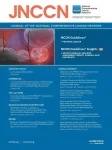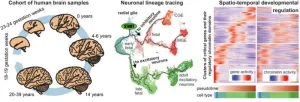(Press-News.org) PLYMOUTH MEETING, PA [October 12, 2023] — New research in the October 2023 issue of JNCCN—Journal of the National Comprehensive Cancer Network finds that intensive local-regional treatment to remove as much tumor as possible (known as “debulking”), in addition to standard systemic therapy, does not impact overall quality of life significantly for people with metastatic colorectal cancer.
The researchers examined the ongoing ORCHESTRA trial (NCT01792934) to compare patients treated with standard palliative chemotherapy alone to those who received palliative chemotherapy plus either surgery, ablative therapy, and/or radiotherapy to reduce their tumor burden. 300 patients were randomized to receive standard care or additional intervention. Significant adverse events were reported in 21% of patients in the standard group and 43% of patients who also received tumor debulking. However, there were no statistical or clinically relevant differences according to patient-reported outcomes for overall health-related quality of life or fatigue.
“This could mean that the negative impact of complications on quality of life is temporary and eventually balances out with a decrease in tumor-related symptoms after treatment. Patients might also adapt their HRQoL perceptions during the course of their disease and treatment.” explained lead author Lotte Bakkerus, MD, Radboud Institute for Health Sciences, The Netherlands. “Given the considerable amount of complications from local treatment, we had expected to see a bigger impact on overall and persistent quality of life in the experimental group. The fact that local therapy associated serious side effects did not translate to a noticeable dip in the patients' perceived quality of life is quite intriguing and warrants further exploration. These results, including the risk of complications, should be taken into account in the consultation room in order to decide, together with the patient, what the right treatment choice is for each individual.”
The study focused on the results from a preplanned exploratory secondary endpoint of Health-Related Quality of Life (HGQol) from the ORCHESTRA trial, which was measured using the EORTC Quality of Life Questionnaire-Core 30 and the Multidimensional Fatigue Inventory questionnaire at pre-specified time points during treatment. The intervention group included first-line FOLFOX or CAPOX +/- bevacizumab plus multi-organ debulking to reduce the tumor by at least 80%. That was compared to the control group of palliative systemic chemo-biologic therapy only.
“Tumor debulking for patients with synchronous oligo-metastatic colorectal cancer is often utilized for curative intent and endorsed in the NCCN Guidelines, with surgical resection preferred over other acceptable treatment-modalities such as radiation therapy or thermal ablation. However, the potential survival benefits for such interventions have not been established for patients with multi-organ rather than single-organ colorectal-cancer metastases. That’s a question that the ORCHESTRA trial is attempting to answer,” commented Charles J. Schneider, MD, FACP, Professor of Clinical Medicine in the University of Pennsylvania Perelman School of Medicine and GI Medical Oncologist at Penn Medicine’s Abramson Cancer Center.
Dr. Schneider, is a member of the NCCN Clinical Practice Guidelines in Oncology (NCCN Guidelines®) Panel for Colon/Rectal/Anal Cancers, and was not involved in this study. He continued:
“The outcome of no statistically significant or clinically relevant differences in HRQoL and fatigue after one year was surprising. More intriguing yet, is the fact that although the patients in the intervention group experienced local treatment related serious adverse events (SAEs) twice as often as patients in the standard group, there was a striking lack of association between the occurrence of SAEs and impact on HRQoL. Thus, this HRQoL ‘equivalence,’ even in the face of twice as many SAE’s in the intervention group, should give guarded justification for multi-organ tumor debulking combined with palliative chemotherapy in select patients, if the survival data turns out to favor the intervention group as well.”
To read the entire study, visit JNCCN.org. Complimentary access to “Health-Related Quality of Life in Paitents with Metastatic Colorectal Cancer Undergoing Systemic Therapy With or Without Maximal Tumor Debulking” is available until January 10, 2024.
# # #
About JNCCN—Journal of the National Comprehensive Cancer Network
More than 25,000 oncologists and other cancer care professionals across the United States read JNCCN—Journal of the National Comprehensive Cancer Network. This peer-reviewed, indexed medical journal provides the latest information about innovation in translational medicine, and scientific studies related to oncology health services research, including quality care and value, bioethics, comparative and cost effectiveness, public policy, and interventional research on supportive care and survivorship. JNCCN features updates on the NCCN Clinical Practice Guidelines in Oncology (NCCN Guidelines®), review articles elaborating on guidelines recommendations, health services research, and case reports highlighting molecular insights in patient care. JNCCN is published by Harborside/BroadcastMed. Visit JNCCN.org. To inquire if you are eligible for a FREE subscription to JNCCN, visit NCCN.org/jnccn/subscribe. Follow JNCCN on Twitter @JNCCN.
About the National Comprehensive Cancer Network
The National Comprehensive Cancer Network® (NCCN®) is a not-for-profit alliance of leading cancer centers devoted to patient care, research, and education. NCCN is dedicated to improving and facilitating quality, effective, equitable, and accessible cancer care so all patients can live better lives. The NCCN Clinical Practice Guidelines in Oncology (NCCN Guidelines®) provide transparent, evidence-based, expert consensus recommendations for cancer treatment, prevention, and supportive services; they are the recognized standard for clinical direction and policy in cancer management and the most thorough and frequently-updated clinical practice guidelines available in any area of medicine. The NCCN Guidelines for Patients® provide expert cancer treatment information to inform and empower patients and caregivers, through support from the NCCN Foundation®. NCCN also advances continuing education, global initiatives, policy, and research collaboration and publication in oncology. Visit NCCN.org for more information.
END
UNIVERSITY PARK, Pa. — True altruism is rare behavior in animals, but a new study by Penn State researchers has found that honey bees display this trait. Additionally, they found that an evolutionary battle of genetics may determine the parent they inherit it from.
For the study, published in the journal Molecular Ecology, the researchers examined the genetics behind “retinue” behavior in worker honey bees, who are always female. After the worker bees are exposed to the queen bee’s pheromone, they deactivate their own ovaries, help spread the pheromone to the other worker bees, and tend to the queen ...
BOSTON – The brain is made up of numerous types of cells that are organized into different structures and regions.
Although several important steps have been made towards building models of the human brain, the advances have not produced undistorted 3D images of cellular architecture that are needed to build accurate and detailed models.
In new research published in Science Advances, a team led by investigators at Massachusetts General Hospital (MGH), a founding member of Mass General Brigham (MGB), has overcome this challenge to offer scientists and clinicians a comprehensive cellular atlas of a part of the human brain known as Broca’s area, with ...
UNIVERSITY PARK, Pa. — An American born in 2019 will spend a larger share of their lifetime taking prescription drugs than being married or receiving an education, according to new research by Jessica Ho, associate professor of sociology and demography at Penn State. She found that American males will spend approximately 48% of their lives taking prescription drugs. The number jumped to 60% for females.
Ho reported her findings this week (Oct. 1) in the journal Demography.
“As an American, I’d like ...
Publishing an ad for an apartment or rental home in Spanish may seem like it would broaden the pool of potential renters, but new research shows it can harm rental-seekers’ perception of the property and its neighborhood.
Finding a new apartment or home to rent can be nerve-wracking and tedious. It is increasingly digital and there are thousands of websites and Facebook groups for prospective renters to peruse. It can be a fraught endeavor — from vetting Craigslist listings to scrolling through hundreds of different listings to find the ...
A longstanding mystery in science is how the over 100 million individual neurons work together to form a network that forms the basis of who we are – every human thought, emotion and behavior.
Mapping these constellations of cells and discovering their function have been long-standing goals of scores of 21st century molecular cartographers working worldwide as part of the National Institutes of Health’s “Brain Initiative Cell Census Network” project. The overarching ...
A team of researchers from the Icahn School of Medicine at Mount Sinai and Yale University School of Medicine has created the first “multiome” atlas of brain cell development in the human cerebral cortex across six broad developmental time points from fetal development into adulthood, shedding new light on their roles during brain development and disease.
“Multiome” refers to the simultaneous analysis of multiple types of genetic information within the same biological sample. They can include the genome, the DNA encoded in our cells; the transcriptome, the RNA copies that the cell makes from the ...
Even highly mobile, large, and long-lived species are sensitive to dynamic and changing conditions as the Arctic warms. A new study reports that population swings in eastern North Pacific grey whales – some of which have resulted in recent mass mortality events – are driven by changing prey biomass and ice cover in the Arctic. Climate change is driving rapid change in Arctic ecosystems, including the highly productive shallow basins of the Pacific Arctic, which are critical marine areas that support seasonal foraging opportunities for various migratory marine species. While climate impacts affect lower-trophic level and short-lived species most directly, ...
Two million years ago, Homo erectus had expanded beyond the lowland savanna environments of East Africa and into the high-altitude regions of the Ethiopian highlands, where they produced both Oldowan and Acheulean tools, according to a new study. It presents a reanalysis of an early hominin fossil first discovered in 1981. The findings provide novel insights into the evolution, migration and adaptive capacities of early human ancestors. In Africa, the limited number of hominin fossils found in direct association with stone tools has hindered attempts to link Homo habilis and Homo erectus with ...
A new probiotic-guided chimeric antigen receptor (CAR)-T platform uses engineered bacteria to infiltrate and produce synthetic antigen targets, enabling CAR-T cells to find, identify, and destroy tumor cells in situ, according to a new study. The combined cell therapy platform expands the scope of CAR-T cell therapy to include difficult-to-target solid tumors. Immunotherapies using CAR-T cells have proven successful in treating some types of blood cancers. However, their efficacy against solid tumors remains elusive. A key challenge facing tumor-antigen targeting immunotherapies like CAR-T is the identification of suitable ...
New pharmaceuticals, cleaner fuels, biodegradable plastics: in order to meet society’s needs, chemists have to develop new synthesis methods to obtain new products that do not exist in their natural state. A research group at the University of Geneva (UNIGE), in collaboration with Cardiff University, has discovered how to use an external electric field to control and accelerate a chemical reaction, like a ‘‘switch’’. This work, to be read in Science Advances, could have a considerable impact on the development of new molecules, enabling not only more environmentally friendly synthesis, but also very simple external control of a chemical reaction.
In ...




